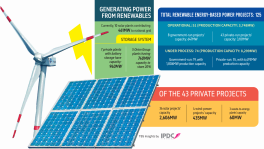World Wetlands Day: Wetlands as nature-based solutions to societal challenges
World Wetlands Day (WWD), celebrated each year on February 2, raises global awareness about the high importance of wetlands for people and our planet. WWD is an occasion to commemorate the signing of the Ramsar Convention in 1971

The theme of WWD 2021 is "Wetlands and water" highlighting the wetlands as a source of freshwater while encouraging actions to restore them and stop their loss. As our world is grappling numerous societal challenges like water scarcity, climate change and biodiversity loss, wetlands are often considered as nature-based solutions providing a range of services to reap social, economic and environmental benefits. This year's theme specifically acknowledges the growing freshwater crisis that threatens people and our planet while recognizing the role of wetlands to address the crisis. However, the Global Assessment Report on Biodiversity and Ecosystem Services by the Intergovernmental Science-Policy Platform on Biodiversity and Ecosystem Services (IPBES) identified wetlands as the most threatened ecosystem, impacting 40% of the world's plant and animal species that live or breed in wetlands. On the other hand, the wetlands are disappearing at an unprecedented rate due to human activities and climate change. We are losing wetlands three times faster than natural forests. According to the World Heritage and Ramsar Conventions, 64% of the world's wetlands have disappeared since the beginning of the last century.
The importance of wetlands cannot be understated, especially for a country like Bangladesh, which relies so much on its incredible diverse wetlands. Nearly half of Bangladesh's total land surface is estimated to be wetlands, equating to an incredible 7-8 million hectares. This is due to Bangladesh's geography, situated in the largest delta of the world in the Ganges-Brahmaputra-Meghna Basin. It is no wonder that the majority of Bangladesh's population rely so heavily on wetlands.
Wetlands provide the entire nation with ecosystem services in the forms of wetland fisheries and agriculture, irrigation, protection against floods and most importantly, source of fresh water. Wetlands are the economic lifeline to the millions of people who are dependent on them.
On the other hand, the country's wetlands also support incredibly rich biodiversity, with countless species like the Ganges River Dolphins, Fishing Cats, and Indian Skimmers, which are threatened with extinction. Nearly half of the total number of bird species in Bangladesh relies on wetland and surrounding habitats. Bangladesh falls in two avian migratory flyways – the East Asian-Australasian Flyway and Central Indian-Asia Flyway - making the wetlands vital for migratory waterbirds across the world. Important wetlands like Tanguar Haor in Sunamganj alone hosts on average 60,000 waterbirds each year.
Overall, wetlands are one of the most effective weapons against the changing climate. Mangroves and peatlands are some of the largest carbon sinks in the world, making them some of the most carbon-dense ecosystems. Bangladesh has been blessed with the largest mangrove forest in the world – the Sundarbans. The 6000 square kilometre stretch of mangrove not only absorbs carbon but also protects the millions of inhabitants on the periphery of the forest from coastal storms and surges.
IUCN is closely associated with the Ramsar Convention on Wetlands and hosting the Secretariat of the Ramsar Convention – at its headquarters near Geneva, Switzerland. IUCN has been collaborating with the Ramsar Convention in many ways, especially through supporting countries in accession to the Convention, providing scientific assistance in the designation of Ramsar sites, piloting site-level management, and supporting the capacity to link local communities with government authorities to ensure the conservation of wetlands. In Bangladesh, Tanguar Haor was established as a Ramsar site in 2000 due to its status as the home to rare and endangered swamp forests, hundreds of species of birds, fishes, amphibians, reptiles and mammals while sustaining the livelihoods of surrounding villages and contributing to national food security. IUCN Bangladesh worked on behalf of the Ministry of Environment, Forests and Climate Change and established a co-management model to converge and develop the natural resources of Tanguar Haor for the benefit of its dependents in association with local communities. In this regard, the Ministry in association with IUCN implemented the Community Based Sustainable Management of Tanguar Haor (CBSMTH) project which has focused on access rights, local empowerment and capacity building to institutionalise and follow Ramsar's wise use principles in natural resource management.

Haors in the northeast of Bangladesh are situated in the transboundary Meghna Basin are considered as key sources of benefit-sharing between Bangladesh and India due to the ecosystem services these wetlands offer for both countries. Considering that, IUCN's Building River Dialogue and Governance in the Ganges – Brahmaputra – Meghna (BRIDGE GBM) initiative has initiated research activities and a long-term dialogue to develop a benefit-sharing strategy for the Meghna Basin considering important services that our wetlands are providing. The strategy will facilitate multi-level cooperation for the inclusive governance and ecologically sound management of the Meghna Basin including the wetlands through considering the challenges like climate change, wetlands degradation, biodiversity loss and poverty. To ensure the development of the strategy inclusively, IUCN is supporting the multi-disciplinary Meghna Advisory Group (MAG) with representatives from the government, civil societies and academia.
As wetlands are dynamic ecosystems and considered as natural connectors between upland and aquatic systems, movement of water and animals within and among wetlands are important to ensure wetland connectivity. Monitoring the movement and taking related actions help in sustaining the wetland biodiversity and thereby the benefits offered by the wetlands. Extensive migratory waterfowl population uses wetlands in Bangladesh as habitat. Bangladesh is within the Central Asian Flyway (CAF) of migratory birds which rest in our resourceful wetlands like Tanguar Haor, Hakaluki Haor and Baikka Beel along with many other wetlands. Since their presence indicates the health and richness of wetlands, IUCN conducts Waterbird Census each year in Bangladesh. IUCN satellite tags migratory ducks in a bid to understand their flight patterns and wetland connectivity. The wild ducks, fitted with these tags send information that is collected on a detailed database accessible to IUCN which is used in the conservation of wild birds and wetlands.
In 2020, IUCN launched the global standard on Nature-based Solutions (NbS) and has been promoting a global community of practice on NbS. Wetlands play a significant role in the practices of NbS as wetland ecosystems reduce the impact of storm surges, cyclones and tsunamis while providing a vital source of food and materials to resource-dependent communities. Well managed urban wetlands provide habitat for a range of species and limit flooding, improve water quality, and improve city-dwellers' health and wellbeing. Moreover, wetlands filter contaminated water and store large water supplies while offering nature-based solutions related to water. With a growing focus on nature-based solutions to address societal challenges, ensure human well-being and reap biodiversity benefits, wetlands are one of the most important solutions we have in Bangladesh. To be able to have our wetlands as nature-based solutions, our effort to protect, sustainably manage, and restore wetland ecosystems of Bangladesh needs to be strengthened to a great deal for stronger preparation in facing the multifaceted future challenges.
Disclaimer: The views and opinions expressed in this article are those of the authors and do not necessarily reflect the opinions and views of The Business Standard.


 Keep updated, follow The Business Standard's Google news channel
Keep updated, follow The Business Standard's Google news channel
















